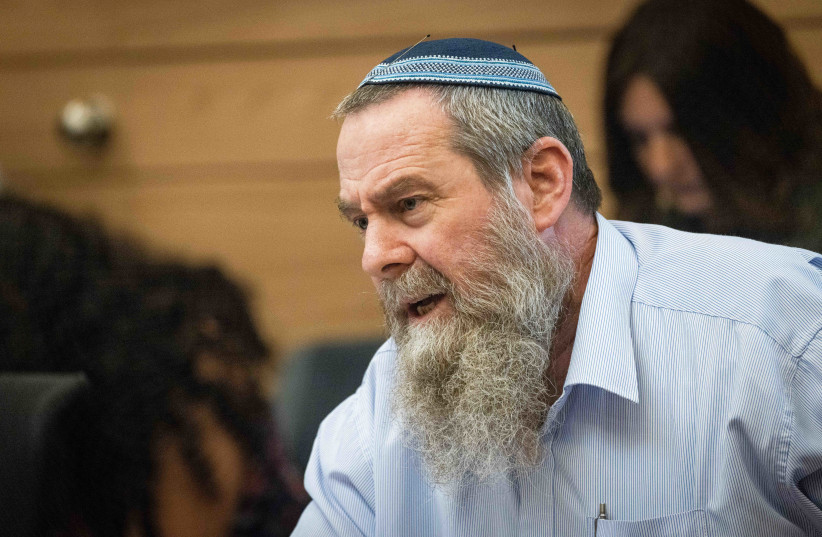The Rosh Yeshiva of Yeshivat Har Etzion, Rabbi Moshe Lichtenstein, requested that Noam Party leader Avi Maoz personally apologize to rabbis from the yeshiva after Maoz stated in an interview that "Har Etzion will not take control" of the religious public education system.
How it all started
Maoz made the comments after Education Minister Yifat Shasha Biton announced last week that she would present candidates for the Council for State-Religious Education, including a number of rabbis and rabbaniot connected to the Har Etzion Yeshiva.
"Har Etzion will not take over here."
Noam Party leader Avi Maoz
"Appointing a [Council for State-Religious Education] during an election is exactly what is not done in a democracy, and therefore it is illegal, any appointment that was made during an election will be canceled after the election," Maoz told Kipa news on Thursday. "This is a list in which Yeshiva Har Etzion has four members, this is an attempt to take over by Deputy Religious Services Minister Matan Kahana, those minor and marginal rabbis will be in the [Council for State-Religious Education], Har Etzion will not take over here."
Maoz apologized for his remarks the day after, stating in a letter to the yeshiva that his remarks were "invalid and inappropriate."

"Although my criticism of the abducted appointment to the [Council for State-Religious Education], on the eve of elections, of the bias of the State-Religious Education leadership in a specific direction that the Deputy Minister of Religious Affairs Matan Kahana is striving for, and of the inappropriate weight given to a very specific group, still stands, but what I said should not have been said, and I apologize and ask for forgiveness for the hurtful things that were said towards you, during the course of the interview, and ask that you accept my apology."
Har Etzion rosh yeshiva respond to Maoz
On Sunday, the head of the yeshiva, Lichtenstein, sent a letter in response to Maoz, stating that any harm to the yeshiva was completely forgiven and expressing appreciation for the Noam Party leader's step in apologizing.
"Despite this, I will stress the obvious, which is that I and my fellow rosh yeshivas can forgive the attack on the institution. However, the personal attack on specific individuals who were called minor requires a personal apology to them since only they are authorized to forgive the insult hurled at them. I'm sure you will want to contact them directly - if this has not already been done - and talk with them," added Lichtenstein.
The rosh yeshiva also invited Maoz to take this opportunity in order to form a real dialogue on disagreements between the two sides.
"I invite you, together with other figures from the educational and rabbinic world, to come and speak with us in an honest, open and deep way on these questions. We would be delighted to hear your approach to public and educational questions on the agenda and to present to you our educational approach and guiding philosophy so that you can hear it from the primary source (as I do not know if you or your colleagues have ever held a deep conversation with educational figures connected to our yeshiva or heard conversations/classes in our beit midrash), and then you can challenge and criticize [our worldview] and present before us your guiding philosophy and positions on these questions and hear our response."
Lichtenstein warned Maoz against delving too far into politics, stressing that the current political environment is tense and competitive and that, in his view, this environment is "the source" of Maoz's statements. "The ability to discuss matters and set a proper example for holding a dispute for the sake of heaven is doubly important [now]."
The rosh yeshiva additionally stressed that Yeshivat Har Etzion does not present a "list of candidates" to the Council for State-Religious Education and that the members of the council are not representing the yeshiva.
'Should there be equal representation in the rabbinate as well?'
In the letter, the rosh yeshiva also addressed a question to the Noam Party leader, stressing that Maoz's main complaint was about an imbalance in the Council for State-Religious Education.
"On a principled level, I definitely agree that it is appropriate to appoint a balanced body that reflects different and diverse educational approaches and not to give one approach all the control," wrote Lichtenstein. "And here I ask whether you and/or your senders agree that this principle is two-way, meaning that even in other public bodies (for example, the Bnei Akiva Plenum, the Chief Rabbinate Council, etc.) there should be a balance in which all approaches are represented and are there other bodies besides the [Council for State-Religious Education] in which you think there should be a balanced and adequate representation of all opinions and approaches?"
The Chief Rabbinate Council is almost entirely composed of Haredi rabbis with little to no representation from other branches of the Jewish community.
